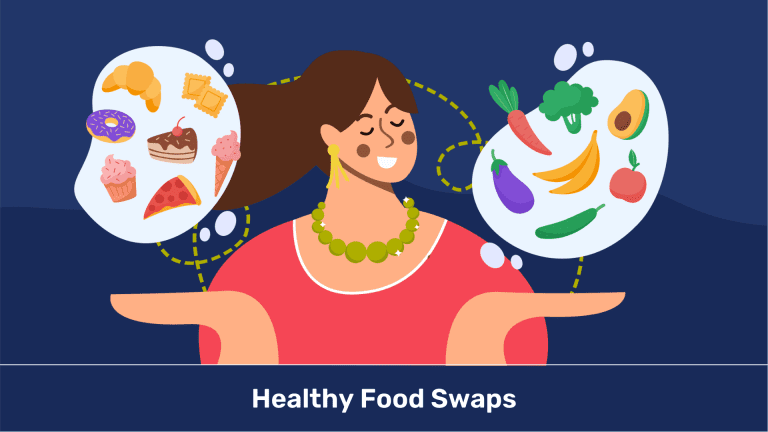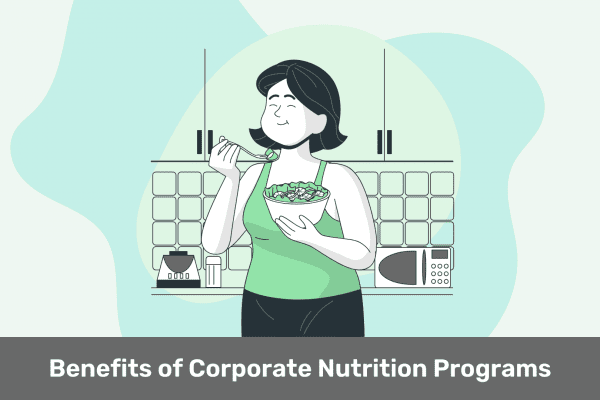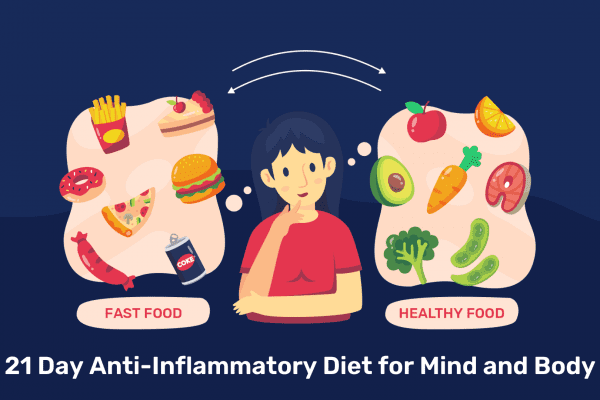Introduction
In an era where nutrition is paramount to overall well-being, the concept of healthy food swaps has emerged as a transformative approach to dietary habits. As individuals increasingly recognize the impact of nutrition on their health, the adoption of healthier food choices has become a prevailing trend.
According to a comprehensive study conducted by the World Health Organization (WHO) in 2022, it was revealed that poor diet is a leading factor in the global burden of disease, contributing to a multitude of health issues, including cardiovascular diseases, diabetes, and obesity.
The significance of healthy food swaps lies in their potential to revolutionize dietary patterns without compromising on taste or satisfaction. A healthy food swap involves substituting less nutritious ingredients with healthier alternatives, thereby enhancing the nutritional profile of meals. With obesity rates on the rise and lifestyle-related diseases becoming increasingly prevalent, incorporating these swaps into daily eating habits has the potential to mitigate health risks and promote longevity.
Statistics indicate that a staggering percentage of the global population does not meet the recommended daily intake of essential nutrients. According to data from the Food and Agriculture Organization of the United Nations (FAO), approximately 9.9% of the world’s population suffers from undernourishment, while an alarming 13.2% grapple with obesity. This dual challenge highlights the need for a paradigm shift in our approach to food consumption.
As we delve into the world of healthy food swaps, this exploration aims to empower individuals with practical knowledge and actionable insights. By making informed choices and embracing healthier alternatives, we can collectively contribute to a global movement towards better nutrition, improved health outcomes, and a more sustainable future.
What are Healthy Food Swaps?
Healthy food swaps refer to the practice of making conscious and intentional substitutions in your diet by replacing less nutritious or calorie-dense ingredients with healthier alternatives. The goal of healthy food swaps is to enhance the overall nutritional quality of meals without sacrificing taste or satisfaction. This dietary approach involves choosing nutrient-dense foods that provide essential vitamins, minerals, and other beneficial compounds while reducing the consumption of ingredients that may contribute to health issues, such as excessive calories, saturated fats, sugars, and sodium.
These swaps can be applied to various aspects of a meal, including ingredients in recipes, snacks, and beverages. Examples of healthy food swaps include choosing whole grains over refined grains, opting for lean proteins instead of fatty cuts, using natural sweeteners in place of added sugars, incorporating more fruits and vegetables, and selecting healthier cooking methods.
By incorporating healthy food swaps into your eating habits, you can positively impact your nutritional intake, manage weight, and reduce the risk of chronic diseases. This approach to food choices encourages a sustainable and balanced way of eating, contributing to overall well-being and long-term health.
Need for Healthy Food Swaps
The need for healthy food swaps arises from the recognition of the profound impact that dietary choices have on overall health and well-being. Several factors contribute to the increasing demand and importance of adopting healthier alternatives in our diets:
- Rising Health Issues: The global surge in lifestyle-related diseases such as cardiovascular diseases, diabetes, and obesity is closely linked to poor dietary habits. Unhealthy eating contributes significantly to these health issues, necessitating a shift toward more nutritious choices.
- Obesity Epidemic: Obesity rates have reached alarming levels worldwide, affecting both adults and children. Poor diet, characterized by excessive consumption of processed foods, sugary beverages, and high-calorie snacks, is a major contributor to the obesity epidemic. Healthy food swaps can help manage weight by reducing calorie and sugar intake.
- Nutrient Deficiency: A significant portion of the global population faces nutrient deficiencies due to inadequate intake of essential vitamins and minerals. Healthy food swaps provide an opportunity to address these deficiencies by incorporating nutrient-rich alternatives into daily meals.
- Promoting Long-Term Health: Chronic health conditions often develop over time, and poor dietary choices can contribute to the onset and progression of these conditions. Healthy food swaps offer a preventive approach, supporting long-term health and reducing the risk of developing diet-related diseases.
- Empowering Individuals: Providing individuals with the knowledge and tools to make healthier food choices empowers them to take control of their own well-being. Healthy food swaps offer a practical and sustainable way for people to improve their diets without feeling deprived or sacrificing taste.
Benefits of Healthy Food Swaps
Healthy food swaps offer a range of benefits that contribute to overall well-being and improved health. Here are some key advantages:
- Enhanced Nutritional Value: Healthy food swaps involve substituting less nutritious ingredients with those that are rich in essential nutrients. This enhances the overall nutritional profile of meals, providing the body with the vitamins, minerals, and other elements it needs for optimal functioning.
- Weight Management: Many unhealthy foods are high in calories, sugars, and unhealthy fats. By making smart food swaps, individuals can reduce their overall calorie intake, helping with weight management and the prevention of obesity. This is particularly important given the global rise in obesity rates.
- Reduced Risk of Chronic Diseases: Adopting healthy food swaps has been associated with a decreased risk of chronic diseases such as cardiovascular diseases, diabetes, and certain types of cancers. A diet rich in nutrient-dense foods can contribute to better heart health, improved blood sugar control, and a lower risk of certain cancers.
- Blood Sugar Regulation: Swapping refined carbohydrates and sugary snacks for healthier alternatives can help regulate blood sugar levels. This is crucial for individuals with or at risk of developing diabetes and can contribute to overall energy stability throughout the day.
- Improved Digestive Health: Healthy food swaps often include incorporating more fiber-rich foods, such as whole grains, fruits, and vegetables. These dietary changes can promote better digestive health by preventing constipation and supporting a healthy gut microbiome.
- Support for Healthy Aging: A diet rich in antioxidants and anti-inflammatory foods, often included in healthy food swaps, can contribute to healthier aging. These dietary choices may help protect the body’s cells from damage and support overall longevity.
10 Healthy Food Swap Ideas
1. White Flour

White flour is a commonly used ingredient in many baked goods and processed foods. It is derived from wheat grains but undergoes a refining process that removes the outer bran and germ layers, leaving only the starchy endosperm. While this process gives white flour a finer texture and longer shelf life, it also strips away many of the nutrients present in whole wheat.
Unhealthy Aspects of White Flour:
-
- Lack of Fiber: The removal of the bran during processing eliminates a significant portion of the fiber content found in whole wheat. Dietary fiber is crucial for digestive health and can help regulate blood sugar levels.
-
- Reduced Nutrient Content: White flour lacks essential nutrients that are present in the bran and germ of whole wheat, such as vitamins, minerals, and antioxidants. This makes it a less nutritionally dense option compared to whole wheat flour.
-
- Rapid Blood Sugar Spikes: Foods made with white flour can lead to rapid spikes in blood sugar levels due to its high glycemic index. This can contribute to insulin resistance over time and increase the risk of developing type 2 diabetes.
Healthier Alternatives to White Flour:
-
- Whole Wheat Flour: Made from the entire wheat kernel, whole wheat flour retains the bran and germ, providing more fiber, vitamins, and minerals compared to white flour.
-
- Almond Flour: Ground almonds offer a gluten-free alternative rich in healthy fats, protein, and vitamin E.
-
- Coconut Flour: Made from dried coconut meat, coconut flour is high in fiber and adds a unique flavor to baked goods.
-
- Oat Flour: Ground oats provide a flour alternative with a good balance of fiber and nutrients.
-
- Quinoa Flour: Made from quinoa seeds, this gluten-free flour is a complete protein source and contains various vitamins and minerals.
-
- Brown Rice Flour: Ground from whole brown rice, this flour option maintains the bran and germ, offering more nutrients and fiber than white rice flour.
2. White Rice

White rice is a staple in many diets, but it undergoes a refining process that removes the outer bran layer and germ, leaving behind the starchy endosperm. This process strips away much of the fiber, vitamins, and minerals found in whole grains. As a result, white rice is primarily composed of carbohydrates and lacks the nutritional depth found in its whole grain counterparts.
Healthier Alternatives:
-
- Brown Rice: Unlike white rice, brown rice retains its bran layer and germ, providing more fiber, vitamins (such as B vitamins), and minerals (such as magnesium and phosphorus).
-
- Quinoa: A complete protein source, quinoa is a seed that contains all essential amino acids. It’s rich in fiber, iron, and magnesium.
-
- Bulgur: Made from cracked whole wheat, bulgur is a quick-cooking whole grain that is high in fiber, vitamins, and minerals.
-
- Wild Rice: Not technically a rice but a grass seed, wild rice is rich in protein, fiber, and various nutrients.
3. Processed Sugar

“Processed sugar” refers to sugars that have undergone significant refinement and processing, resulting in a product that is often stripped of its natural nutrients and fiber. This type of sugar is commonly found in various processed foods and beverages, contributing to their sweetness but offering little to no nutritional value.
Healthier Alternatives:
-
- Natural sweeteners such as honey, maple syrup, or agave nectar are often considered healthier alternatives. While these still contribute sweetness, they may retain some of the original nutrients and antioxidants found in the source plants.
-
- Whole Fruits can also be used to add sweetness to dishes naturally. They come with the added benefits of fiber, vitamins, and minerals, providing a more balanced approach to satisfying a sweet tooth.
Read Further: No Sugar Challenge
4. Vegetable Oils

Vegetable oils are often scrutinized due to the prevalent use of highly processed and refined options that may contain high levels of omega-6 fatty acids and undergo chemical processes during production. These factors have raised concerns about their potential negative impact on health when consumed in excess.
Unhealthy Vegetable Oils:
-
- Common Culprits: Soybean oil, corn oil, and other processed vegetable oils.
- Issues: These oils may be high in omega-6 fatty acids, which, when not balanced with sufficient omega-3 fatty acids, can contribute to inflammation in the body. Additionally, the refining processes can strip away some of the natural nutrients found in the original plant source.
Healthier Alternatives:
-
- Olive Oil: Extra virgin olive oil is a healthier alternative rich in monounsaturated fats and antioxidants. It has been associated with various health benefits, including heart health.
- Avocado Oil: This oil is high in monounsaturated fats, which can contribute to heart health. It also has a high smoke point, making it suitable for cooking at higher temperatures.
- Coconut Oil: While it is high in saturated fats, coconut oil is often considered a healthier option due to its unique fatty acid profile. It contains medium-chain triglycerides (MCTs), which may have some health benefits.
5. Deep Fried Foods

Deep-fried foods refer to items that are cooked by submerging them in hot oil, resulting in a crispy exterior. While deep-frying can create a delightful texture and flavor, it often involves immersing the food in oil at high temperatures, which can have both nutritional and health implications.
Unhealthy Aspects of Deep-Fried Foods:
-
- High Caloric Content: Deep-fried foods are often calorie-dense due to the absorption of oil during the frying process. This can contribute to an excessive calorie intake, potentially leading to weight gain if consumed regularly.
-
- Unhealthy Fats: Many deep-fried foods are cooked in oils that may contain unhealthy fats, such as trans fats or saturated fats. Consuming these fats in excess has been linked to an increased risk of heart disease and other health issues.
-
- Sodium Intake: Deep-fried foods, especially when bought from fast-food outlets, may be heavily salted to enhance flavor. Excessive sodium intake is linked to high blood pressure and an increased risk of cardiovascular diseases.
-
- Low Nutrient Content: Deep-fried foods often lack essential nutrients. The cooking process can strip foods of vitamins and minerals, and the batter or coating used in frying may not contribute significant nutritional value.
Healthier Alternatives to Deep-Fried Foods:
-
- Baked or Grilled Options: Opting for baked or grilled alternatives to deep-fried foods can significantly reduce the amount of added fats and calories while preserving flavor and texture.
-
- Air-Frying: Air-fryers use hot air circulation to cook food, providing a crispy texture similar to deep-frying but with significantly less oil. This method can be a healthier alternative for those who enjoy the texture of fried foods.
-
- Choosing Healthier Oils: If deep-frying is unavoidable, using healthier oils like olive oil or avocado oil can improve the overall nutritional profile of the dish.
-
- Portion Control: Consuming deep-fried foods in moderation is key. Portion control can help manage caloric intake and reduce the potential negative health effects associated with frequent consumption.
6. High-Sugar Breakfast Cereals

These cereals are often marketed as quick and convenient breakfast options, but they can contribute to various health issues when consumed regularly.
Unhealthy Aspects:
-
- Empty Calories: The added sugars in these cereals contribute to empty calories, providing energy without accompanying essential nutrients. Consuming foods high in empty calories can lead to overconsumption of energy without meeting the body’s nutritional needs.
-
- Blood Sugar Spikes and Crashes: High-sugar cereals can lead to rapid spikes in blood sugar levels after consumption. This can be followed by a subsequent crash, leading to feelings of fatigue and hunger, and potentially contributing to insulin resistance over time.
-
- Weight Gain: Regular consumption of high-sugar cereals has been linked to weight gain and an increased risk of obesity. The excess calories from added sugars, combined with the lack of satiating nutrients, can contribute to overeating throughout the day.
-
- Dental Health Issues: The high sugar content in these cereals can contribute to dental problems, including cavities and tooth decay. The prolonged exposure of teeth to sugary substances can harm dental health over time.
Healthier Alternatives:
-
- Whole-Grain Cereals: Opt for whole-grain or bran cereals that are lower in added sugars and higher in fiber. These can help provide sustained energy and promote better digestive health.
-
- Oatmeal: Plain oatmeal, steel-cut oats, or rolled oats are excellent alternatives. They are rich in fiber, provide a steady release of energy, and can be customized with healthy toppings such as fruits, nuts, and seeds.
-
- Homemade Granola: Making your own granola allows you to control the ingredients and reduce added sugars. Use ingredients like oats, nuts, seeds, and a touch of natural sweeteners like honey or maple syrup.
-
- Greek Yogurt with Fresh Fruit: Combine plain Greek yogurt with fresh fruits like berries, which add natural sweetness without the need for added sugars.
7. Soda and Sugary Beverages

These drinks provide little to no nutritional value while contributing to various health concerns.
Unhealthy Aspects
-
- Added sugars, artificial sweeteners, and preservatives are found in soft drinks, soda and sugary beverages.
- Concerns: These beverages are a significant source of empty calories, meaning they provide energy (calories) but lack essential nutrients like vitamins and minerals. Regular consumption of sugary drinks has been linked to weight gain, obesity, type 2 diabetes, and dental issues.
Healthier Alternatives:
-
- Water: Pure and simple water is the healthiest beverage choice. It hydrates the body without adding extra calories or sugars.
-
- Herbal Teas: Unsweetened herbal teas, hot or iced, provide a flavorful and hydrating alternative. They can be enjoyed plain or with a splash of lemon for added taste.
-
- Infused Water: Add natural flavors to water by infusing it with slices of fresh fruits, vegetables, or herbs. This adds a refreshing twist without the added sugars.
-
- Sparkling Water: For those who enjoy the fizziness of sodas, sparkling water (plain or flavored) is a great alternative. Look for options without added sugars or artificial sweeteners.
8. Processed Meats

Processed meats refer to meats that have been transformed through various methods such as salting, curing, smoking, or adding preservatives. Common examples include sausages, hot dogs, bacon, deli meats, and certain types of ham. These products often undergo industrial processing, which can involve the addition of sodium, nitrates, and other preservatives. Processed meats consumption can increase cardiovascular disease and certain types of cancer.
Healthier Alternatives:
-
- Unprocessed Lean Meats:
- Skinless chicken or turkey breast, lean cuts of beef or pork.
- Opt for fresh, unprocessed cuts of lean meat. These alternatives provide essential nutrients like protein without the additives found in processed meats.
- Unprocessed Lean Meats:
-
- Plant-Based Alternatives:
- Legumes (beans, lentils), tofu, tempeh, and seitan.
- Plant-based alternatives are often lower in saturated fats and can provide a good source of protein. They also offer a variety of textures and flavors.
- Plant-Based Alternatives:
-
- Homemade Deli Meats:
- Roasting and slicing your own turkey or chicken.
- You can avoid the additives commonly found in processed deli meats by preparing deli meats at home.
- Homemade Deli Meats:
-
- Canned Fish:
- Canned tuna or salmon.
- Canned fish is a convenient and healthy alternative. Choose varieties packed in water for lower sodium content.
- Canned Fish:
-
- Nut Butters:
- Peanut butter, almond butter.
- These spreads are protein-rich alternatives that can be used as sandwich fillings or in wraps instead of processed meat.
- Nut Butters:
-
- Egg-based Options:
- Hard-boiled eggs or egg salad.
- Eggs are a good source of protein and can be used as a sandwich filling or added to salads.
- Egg-based Options:
9. Commercial Salad Dressings

Commercial salad dressings refer to ready-made dressings available in supermarkets. These dressings are often convenient but may contain ingredients that are less than optimal for health. Here’s an explanation of why commercial salad dressings are considered less healthy and some healthier alternatives:
Unhealthy Aspects:
-
- Many commercial salad dressings contain added sugars to enhance flavor. Excessive sugar intake is linked to various health issues, including weight gain and an increased risk of chronic diseases.
-
- Some dressings use highly processed vegetable oils, which, when consumed in excess, may contribute to inflammation. Trans fats, often found in processed oils, can also be present in some commercial dressings.
-
- Commercial dressings may contain preservatives and additives, which might not be beneficial for health in the long run.
Healthier Alternatives:
-
- Homemade Dressings: Creating your own salad dressings allows you to control the ingredients. Use heart-healthy oils like olive oil, add balsamic or apple cider vinegar for acidity, and incorporate herbs and spices for flavor.
-
- Olive Oil and Vinegar: A simple and classic combination of extra virgin olive oil and balsamic or red wine vinegar can be a delicious and nutritious dressing. You can customize it with herbs, garlic, or Dijon mustard for added flavor.
-
- Greek Yogurt Dressings: Greek yogurt-based dressings provide a creamy texture without the excess calories. Combine Greek yogurt with lemon juice, herbs, and a touch of honey for a tasty alternative.
-
- Avocado-Based Dressings: Blend ripe avocado with lime or lemon juice, garlic, and herbs to create a creamy and nutritious dressing that adds healthy fats to your salad.
-
- Tahini Dressings: Tahini, made from ground sesame seeds, can be mixed with lemon juice, garlic, and water to create a rich and flavorful dressing.
10. Regular Potato Chips

These chips are typically deep-fried in oil and are known for their crispy texture and salty flavor. However, they come with a high content of unhealthy fats, sodium, and sometimes preservatives.
Healthier Alternatives:
-
- Baked Sweet Potato Chips: Making chips from sweet potatoes provides a healthier alternative. Sweet potatoes are rich in vitamins, fiber, and antioxidants. Baking them instead of frying reduces the amount of added fats.
-
- Air-Popped Popcorn: Air-popped popcorn is a whole grain and a good source of fiber. It can be a satisfying and crunchy snack when seasoned with herbs or nutritional yeast.
-
- Vegetable Chips: Creating chips from a variety of vegetables, such as kale, beets, or zucchini, can offer a nutrient-packed alternative. Baking or dehydrating these vegetables helps retain their nutritional value.
Final Thoughts
Embracing healthy food swaps is a powerful step toward a more nourishing and balanced lifestyle. The impact of these swaps extends beyond mere dietary choices; it influences overall health, energy levels, and well-being.
Woliba platform stands as a valuable companion on your path to healthier living. Woliba is committed to empowering individuals with the resources they need for successful and enjoyable healthy food swaps. Our platform offers a wealth of nutritional information and a diverse array of recipes. Our curated recipes prioritize both nutritional value and culinary satisfaction.
Contact us now to unlock the benefits of healthy food swaps, and let Woliba be your trusted partner in creating a healthier, more vibrant you.





